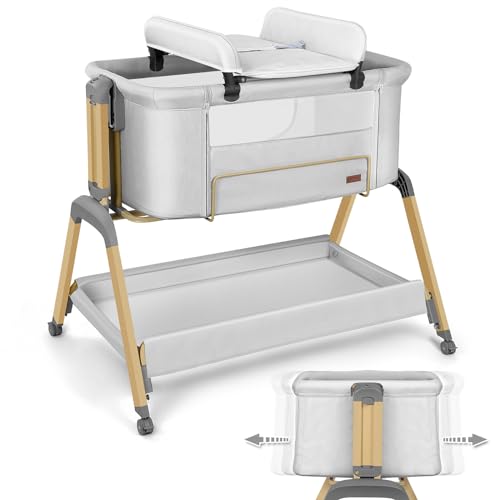Bedside Cot Co Sleeper Tools To Help You Manage Your Everyday Lifethe …
페이지 정보

본문
 bedside cot wooden Co-Sleeper - What is a Bedside Co-Sleeper?
bedside cot wooden Co-Sleeper - What is a Bedside Co-Sleeper?A bedside cot co sleeper is a bassinet that can be attached to the side of your bed and allows you to reach out for your baby during the night. This kind of co-sleeping has been suggested by The Lullaby Trust and NHS as it lets you keep your baby close without risking SIDS.
 Peace of Mind
Peace of MindCo-sleeping is a great parenting choice. Many parents are concerned that sleeping close to their child increases the risk of SIDS. However studies like those conducted by NHS suggest the opposite. Co-sleeping is sharing the same sleeping surface, which can increase the risk for SIDS. Bedside cot co sleepers are designed to provide a safe place to rest between bed sharing and separate sleeping surfaces, allowing a parent to reach over their child and gently nurse or comfort them, without leaving the comfort of their own bed.
It is essential to feed and soothe your baby frequently. However, parents who are tired might find it difficult to get up from their bed to feed their child. The bedside sleeper gives parents the option of keeping their baby close and not have to leave their comfortable bedding. Some co sleepers have an innovative design, such as the SnuzPod. The four walls can be opened to convert the cot into a cradle, giving an additional layer of protection. This allows tired parents to watch their newborns while they sleep.
It is important to keep in mind that the risk of SIDS increases when a parent smokes (even with a co-sleeper) and when alcohol or drugs are consumed even in small quantities. Co-sleeping with children is not recommended if the parent has an history of sleeping through the night. The NHS recommends that babies rest on their backs to limit the risk of suffocation as well as accidental rolling. A bassinet or bedside cot is the safest way to make sure this is done.
Safety
While co-sleeping is commonly practiced in a variety of countries, the NHS recommends that infants be in their own cots rather than sharing a bed. This is due to the increased risk of overheating and suffocation. When a baby is in bed with their parents are more likely to be covered by blankets, pillows or sheets. This can lead to SIDS. This is why a crib that is placed near the bed is an ideal solution. The crib is near the parents, which prevents the baby from overheating or suffocating. baby. It can still be easily reached for feedings at night and for comforting.
Parents from all over the world were eagerly anticipating the Dutch cosleeping pod when it first became viral in 2004. They wanted to test safe cosleeping. Despite the excitement doctors don't support the idea of a bed that connects to the side of a adult bed.
The main concern is that a parent could fall on the infant and cause strangulation or the child to suffocate. This is particularly true in the case of a parent who is asleep while smoking, drinking or taking drugs. Other dangers include overheating, the risk of falling, and the risk of a maternal death during pregnancy and after the birth of a child.
If you decide to go with a bedside sleeper, it's essential that you choose a model that meets the highest standards of safety. The mattress must be fitted without gaps and should not be prone sagging. It is also important to familiarize yourself with the weight limitations and age recommendations for sleepers.
All new bedside beds must be compliant with a new safety standard that was announced in November of 2020 and replaces previous standards. There may be older models for sale in some shops, but these are slowly disappearing as manufacturers make the transition to the new safety standards.
If you choose to purchase a second-hand mattress be sure it is in good shape before purchasing it. Make sure that the mechanism that holds the bed to the parent's bed is sturdy and doesn't leave a gap. Also, ensure that the mattress fits properly in the sleeper without any gaps or bulges. Sheets should be snugly fitted too, so that the baby can't squiggle around and end up in a pocket or be at risk of being suffocated.
Convenience
Many new parents feel a natural urge to be at their baby's side at night, but sleep experts like Lullaby Trust recommend avoiding bed-sharing. A bassinet or best bedside cots crib can be a safer option. These cribs are designed to attach directly to the bed of the parent to allow the baby to be easily reached for feeding and resting at night. This means that exhausted parents do not have to leave their bed at night, and they can keep a close watch on their child while still getting a goodnight's sleep.
Babies who have separate bedrooms are more likely than others to suffer breathing pauses (apnoea), and also are at a higher risk of SIDS. Research has found that babies sleep better when they are in close to their parents. Having your baby in co-sleeping also means that you are able to swiftly respond to any problems and soothe them, so they will be more relaxed.
The best bedside cot for newborn bedside bassinet or crib for your family is dependent on many aspects, including the living situation and future plans. For instance, if live with a partner or household member who may want to use the bedside crib then it might be beneficial to consider convertible options that can grow into separate cribs or toddler beds as your baby grows older. A lot of our cribs have this option, and we suggest contact us for more details.
The bedside crib that turns into cot crib fosters bonding between the mother and baby. It's a practical and safe option for new parents who are tired. Studies have shown that mothers who breastfeed tend to breastfeed longer when their baby is near and this creates an even stronger and more secure bond between them.
A bedside cot could be a great option for new mothers who want to keep their infant nearby. When buying a bassinet, or co-sleeper, you need to ensure that it meets all the Lullaby Trust and safe sleep guidelines. It's also worth considering what your budget is because there are options at all price points.
- 이전글Can you Pass The What Was 10 Months Ago From Today Test? 25.01.16
- 다음글35 Days Ago From Today Tips & Guide 25.01.16
댓글목록
등록된 댓글이 없습니다.
